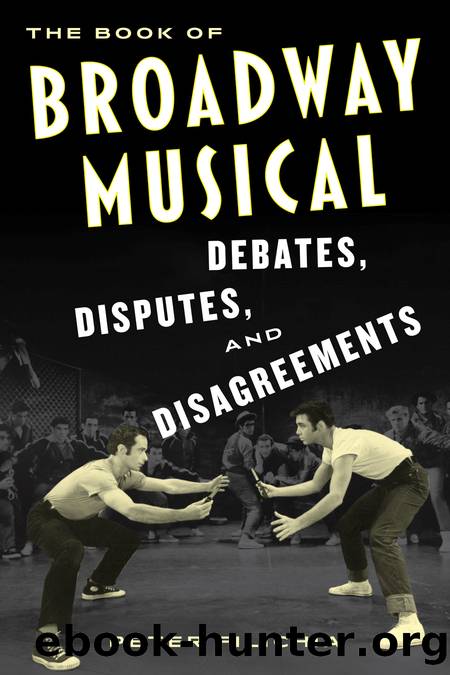The Book of Broadway Musical Debates, Disputes, and Disagreements by Peter Filichia

Author:Peter Filichia
Language: eng
Format: epub
Publisher: Applause
Published: 2022-06-25T00:00:00+00:00
WHAT PERSON CONNECTED WITH MUSICALS HAD THE BEST LUCK?
Shirley MacLaine (The Pajama Game, 1954). Even many with no knowledge of Broadway know that Hollywood producer Hal B. Wallis specifically attended the Adler-Ross hit to see Carol Haney, but caught understudy MacLaine instead. He was so smitten that he rushed backstage after the show and offered her a five-year contract.
However, thereâs more to the familiar story. Earlier on that fateful June 29, 1954, night, MacLaine had accepted a job as Gwen Verdonâs understudy in Can-Can. When she arrived at The Pajama Game to do her chorus stint, she planned to give notice.
MacLaine didnât have time. She had to get ready to play Haneyâs role.
A further irony is that MacLaine did wind up doing Can-Canâbut in the 1960 film version. It was her tenth film in five years; sheâs since done almost four dozen others.
Haney appeared in all of two feature films, including reprising her role in The Pajama Game. She turned to choreography for the Broadway productions of Flower Drum Song, She Loves Me, and Funny Girl. The latter was her final job, for she endured a much-too-early death at thirty-nine, a mere seven weeks after the musical had opened.
This story is so emblematic of the successful understudy that Lee Adams, when writing the lyrics for a song in Applause (1970), referenced the situation after Eve Harrington went on for Margo Channing: âYou got up early and pulled a Shirley MacLaine.â
Betty Comden. One subplot in Bells Are Ringing (1956) involved a dentist who yearned to be a composer. Only a week after the show opened, Happy Hunting debuted with music composed by Harold Karr, DDS.
Many on Broadway wondered if Betty Comden and her writing partner Adolph Green had heard about Karrâs day job and wrote such a dilettante into their show.
No. Comden stated that the idea originated from her own dentist. Whenever she arrived for an appointment, heâd take his air hose and maneuver it to play pop songs.
âThat,â she said to herself, âbelongs in a musical.â
Good thing that she didnât go to a different dentist.
James Kirkwood. One night he decided to see what Michael Bennett, who choreographed and codirected his Follies, had accomplished with Neil Simonâs newest play Godâs Favorite.
At intermission, Kirkwood strolled into the lobby where Bennett saw and approached him. He needed an additional bookwriter for this musical he was creating: A Chorus Line.
Considering the results, Kirkwood might have felt that he was Godâs favorite.
Sutton Foster. Erin Dilly wasnât well on the day that she was to play the title character in Thoroughly Modern Millieâs first-ever full run-through at University of California, San Diego. Foster only knew the songs but hadnât memorized the dialogue, so she carried a script with her. Nevertheless, the showâs team knew theyâd found their ideal Millie.
Foster made such an impression that composer Jeanine Tesori and Dick Scanlan were motivated to write an eleven oâclock number, âGimme Gimme,â that became one of the showâs highlights. It helped Foster to win her first Tony Award and a secure place on Broadway and in London.
Download
This site does not store any files on its server. We only index and link to content provided by other sites. Please contact the content providers to delete copyright contents if any and email us, we'll remove relevant links or contents immediately.
The Goal (Off-Campus #4) by Elle Kennedy(13645)
Kathy Andrews Collection by Kathy Andrews(11800)
Diary of a Player by Brad Paisley(7542)
What Does This Button Do? by Bruce Dickinson(6191)
Assassin’s Fate by Robin Hobb(6191)
Big Little Lies by Liane Moriarty(5780)
Altered Sensations by David Pantalony(5091)
Pale Blue Dot by Carl Sagan(4990)
Sticky Fingers by Joe Hagan(4181)
The Death of the Heart by Elizabeth Bowen(3599)
The Heroin Diaries by Nikki Sixx(3537)
Beneath These Shadows by Meghan March(3296)
Confessions of a Video Vixen by Karrine Steffans(3292)
How Music Works by David Byrne(3252)
The Help by Kathryn Stockett(3131)
Jam by Jam (epub)(3070)
Harry Potter 4 - Harry Potter and The Goblet of Fire by J.K.Rowling(3050)
Computational Linguistics and Intelligent Text Processing: 20th International Conference, CICLing 2019 La Rochelle, France, April 7â13, 2019 Revised Selected Papers, Part I by Alexander Gelbukh(2976)
Strange Fascination: David Bowie: The Definitive Story by David Buckley(2850)
